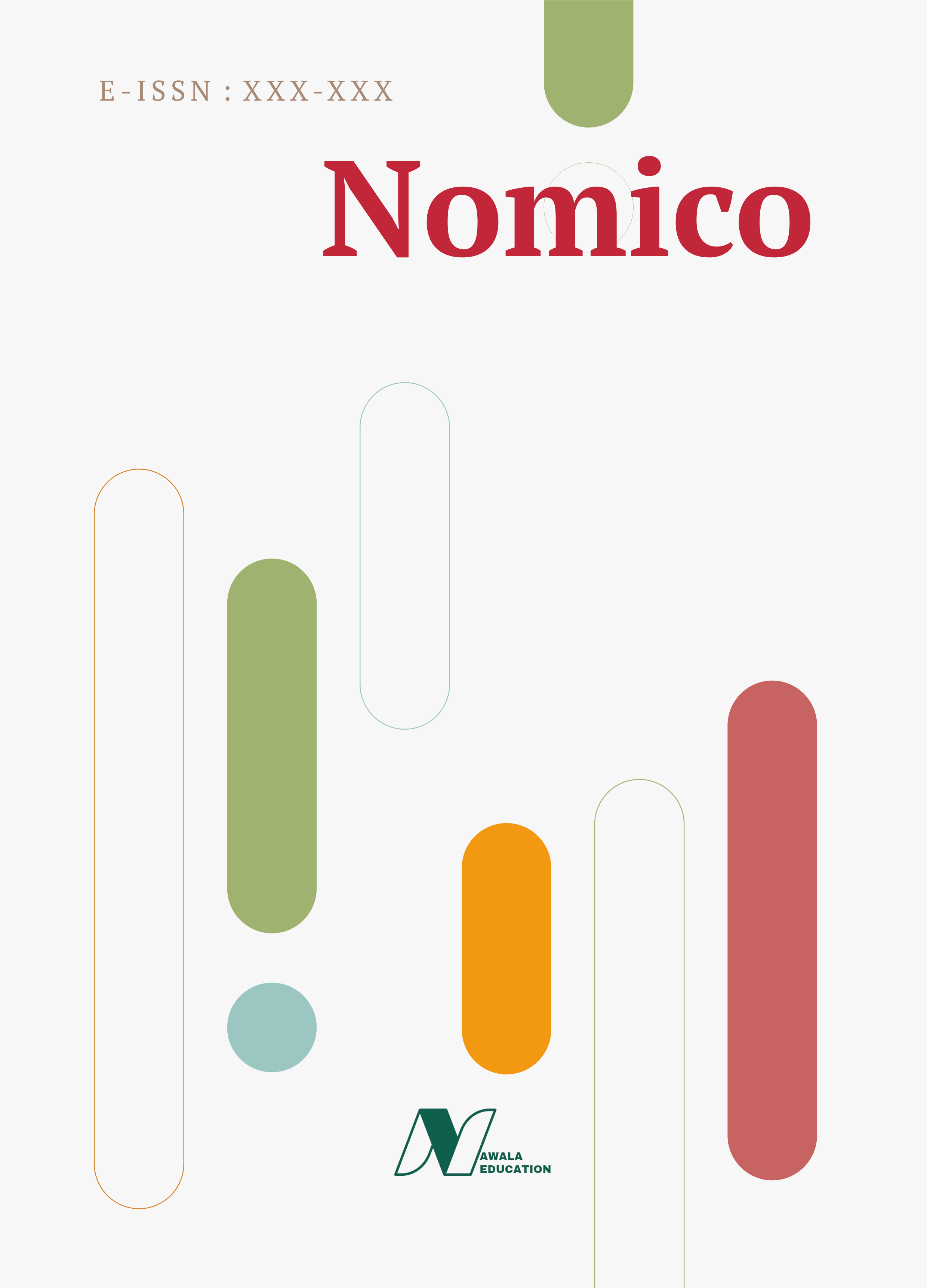Banking Digitalization in the Era of Revolution 5.0: Opportunities and Risks for Financial Inclusion
DOI:
https://doi.org/10.62872/x3ta4h52Keywords:
Banking, digitalization, financial inclusionAbstract
Banking digitalization in the Revolution 5.0 era plays a key role in accelerating financial inclusion by leveraging digital technology to expand access to financial services for previously underserved communities. Technologies such as mobile banking, fintech, and blockchain have enabled faster, cheaper, and more accessible financial transactions, even by those who live in remote areas or do not have access to traditional banking services. However, challenges related to data security, cyber threats, inequality of access to technology, and low digital literacy are the main obstacles in realizing comprehensive financial inclusion. This study aims to examine the opportunities and risks associated with banking digitalization in the Revolution 5.0 era, as well as suggest strategies to overcome these challenges. Collaboration between the public and private sectors is needed to build a more equitable digital infrastructure, increase digital literacy, and develop regulations that protect the security of user data and transactions. With an inclusive and coordinated approach, banking digitalization is expected to create a more efficient, fair, and sustainable financial system, as well as provide broader economic opportunities for all levels of society.
Downloads
References
Adha, L. A. (2020). Digitalisasi Industri Dan Pengaruhnya Terhadap Ketenagakerjaan Dan Hubungan Kerja Di Indonesia. Journal Kompilasi Hukum, 5(2), 267–298. https://doi.org/10.29303/jkh.v5i2.49
Alfarizi, M., Kamila Hanum, R., Andriana Firmansyah, A., & Wusqo, U. (2023). Digital Banking dalam Akselerasi Pemberdayaan Ekonomi Womenpreneur Indonesia : Eksplorasi Sosial-Ekonomi dan Peran LPS Berbasis PLS-SEM. Jurnal Magister Ekonomi Syariah, 2(2 Desember), 1–32. https://doi.org/10.14421/jmes.2023.022-01
Alidha, M., Sari, A. P., Sopiatunnisa, R., Azzahra, A., & Nurhalizah, L. (2024). Analisis Dampak Digitalisasi Layanan Perbankan terhadap Loyalitas Nasabah di Era Revolusi Industri 4.0. Contemporary Journal of Applied Sciences, 2(3). https://doi.org/10.14710/nts.v16i3.42305
Ashmore, F. H., Farrington, J. H., & Skerratt, S. (2017). Community-led broadband in rural digital infrastructure development: Implications for resilience. Journal of Rural Studies, 54, 408–425. https://doi.org/10.1016/j.jrurstud.2016.09.004
Basuki, F. H., & Husein, H. (2018). ANALISIS SWOT FINANCIAL TECHNOLOGY PADA DUNIA PERBANKAN DI KOTA AMBON (Survei Pada Bank di Kota Ambon). Manis: Jurnal Manajemen Dan Bisnis, 1(2), 60–74. https://doi.org/10.30598/manis.1.2.60-74
Claessens, S., Djankov, S., & Nenova, T. (2001). Corporate Growth and Risk around the World. Financial Crises in Emerging Markets, 305–338. https://doi.org/10.1017/cbo9780511572159.017
Febrianto, F., Sasmita, N., Khumairoh, S., Sajida, F. H., Nurfita, W., Indah, A., ... & Karim, K. (2024). Pendampingan Perilaku Manajerial Keuangan Masyarakat Pesisir Berbasis Menabung guna Meningkatkan Literasi Keuangan di Desa Nelayan Bhakti Kabupaten Wakatobi. Pabitara: Jurnal Pengabdian Masyarakat, 3(2). https://doi.org/10.58518/paritcipatory.v1i2.1833
Gomber, P., Kauffman, R. J., Parker, C., & Weber, B. W. (2018). On the Fintech Revolution: Interpreting the Forces of Innovation, Disruption, and Transformation in Financial Services. Journal of Management Information Systems, 35(1), 220–265. https://doi.org/10.1080/07421222.2018.1440766
Gunarso, C., Tiosanders, J., Loewe, L., Holanda, S., & Halim, W. (2024). Analisis Peran Teknologi Blockchain Dalam Membangun Sistem Keuangan Terdesentralisasi Yang Inklusif Dan Efisien. Nusantara Journal of Multidisciplinary Science, 2(4), 794-805. https://doi.org/10.62504/jimr917
Hasan, S. A., Al-Zahra, W. N., Auralia, A. S., Maharani, D. A., & Hidayatullah, R. (2024). Implementasi Teknologi Blockchain dalam Pengamanan Sistem Keuangan pada Perguruan Tinggi. Jurnal MENTARI: Manajemen, Pendidikan Dan Teknologi Informasi, 3(1), 11–18. https://doi.org/10.33050/mentari.v3i1.546
Jameaba, M. (2020). Digitization, FinTech Disruption, and Financial Stability: The Case of the Indonesian Banking Sector. SSRN Electronic Journal. https://doi.org/10.2139/ssrn.3529924
Kanungo, R. P., & Gupta, S. (2021). Financial inclusion through digitalisation of services for well-being. Technological Forecasting and Social Change, 167, 120721. https://doi.org/10.1016/j.techfore.2021.120721
Kaur, S. J., Ali, L., Hassan, M. K., & Al-Emran, M. (2021). Adoption of digital banking channels in an emerging economy: exploring the role of in-branch efforts. Journal of Financial Services Marketing, 26(2), 107–121. https://doi.org/10.1057/s41264-020-00082
Kumar, S., 2017. Digital Healthcare challenge and opportunity India. Retrieved from https://www.linkedin.com/pulse/digital-healthcare-challenge-and-opportunity-indi a-sudeep-kumar, accessed on 02/06/2020. https://doi.org/10.1057/9781137382559.0024
Lubis, N. S., & Nasution, M. I. P. (2023). Perkembangan Teknologi Informasi Dan Dampaknya Pada Masyarakat. Kohesi: Jurnal Sains dan Teknologi, 1(12), 41-50. https://doi.org/10.31219/osf.io/m7cvq
Murinde, V., Rizopoulos, E., & Zachariadis, M. (2022). The impact of the FinTech revolution on the future of banking: Opportunities and risks. International Review of Financial Analysis, 81, 102103. https://doi.org/10.1016/j.irfa.2022.102103
Nazwirman, N. (2008). Peranan Lembaga Keuangan Mikro Berbasis Teknologi Informasi dalam Mengembangkan Usaha Mikro. The Winners, 9(2), 124. https://doi.org/10.21512/tw.v9i2.721
Ngamal, Y., & Maximus Ali Perajaka. (2021). PENERAPAN MODEL MANAJEMEN RISIKO TEKNOLOGI DIGITAL DI LEMBAGA PERBANKAN BERKACA PADA CETAK BIRU TRANSFORMASI DIGITAL PERBANKAN INDONESIA. JURNAL MANAJEMEN RISIKO, 2(2), 59–74. https://doi.org/10.33541/mr.v2iiv.4099
Nottingham, K. D., & Cardozo, I. (2021). The Role of International Consumer Policy in Fostering Innovation and Empowering Consumers to Make Informed Choices. Indiana International & Comparative Law Review, 30(1), 1–31. https://doi.org/10.18060/25062
Putri, D. C. P., & Lutfianti, A. (2024). Peran Teknologi Finansial FinTech dalam Mengubah Layanan Perbankan Tradisional. Media Hukum Indonesia (MHI), 2(4). https://doi.org/10.31004/irje.v4i3.1007
Sofiandi, S., Hasanah, N. H. N., Nuh, Z. M., & Riansyah, R. TOLERANSI DAN INKLUSI DALAM SISTEM KEUANGAN Sebuah Upaya Menumbuhkan Ekonomi Berkelanjutan. TOLERANSI: Media Ilmiah Komunikasi Umat Beragama, 15(1), 16-29. https://doi.org/10.24014/trs.v10i1.5720
Sudarmanto, E., Yuliana, I., Wahyuni, N., Yusuf, S. R., & Zaki, A. (2024). Transformasi Digital dalam Keuangan Islam: Peluang dan Tantangan. Jurnal Ilmiah Ekonomi Islam, 10(1), 645. https://doi.org/10.29040/jiei.v10i1.11628
Yoon, N., & Lee, H.-K. (2021). AI Recommendation Service Acceptance: Assessing the Effects of Perceived Empathy and Need for Cognition. Journal of Theoretical and Applied Electronic Commerce Research, 16(5), 1912–1928. https://doi.org/10.3390/jtaer16050107
Zhuo, T., 2012. Understanding users’ initial trust in mobile banking : an elaboration likelihood perspective. Comput. Hum. Behav. 28 (4), 1518-1525.
Downloads
Published
Issue
Section
License
Copyright (c) 2024 Adrian Eka Darma Serang (Author)

This work is licensed under a Creative Commons Attribution-ShareAlike 4.0 International License.

This work is licensed under a Creative Commons Attribution-ShareAlike 4.0 International License.











